Understanding Childhood Asthma: Triggers, Treatment, and Everyday Care
Are you constantly living in fear of your child's next asthma attack, feeling helpless watching your child struggle to breathe? Asthma is a long-term condition that affects children worldwide. Around the world, millions of people have asthma, with a significant proportion being children.
For parents and caregivers, understanding the nature of childhood asthma, its triggers, treatment options, and day-to-day management is essential in helping children lead healthy, active lives. This blog will guarantee you a better understanding of childhood asthma.
Understanding Childhood Asthma
What Is Childhood Asthma?
Childhood asthma is a chronic inflammatory condition of the airways that causes them to swell, narrow, and produce extra mucus. While asthma can affect people of all ages, it often starts in childhood. Some children may outgrow childhood asthma, while others may continue to manage it throughout life.
What are the Important Signs of Childhood Asthma?
-
Frequent Coughing
-
Wheezing
-
Shortness of Breath
-
Chest Tightness or Pain
-
Rapid Breathing
-
Fatigue or Weakness
-
Trouble Sleeping
-
Symptoms worse After Triggers
-
Delayed Recovery from Respiratory Infections
What are the Types of Childhood Asthma?
-
Allergic (Extrinsic) Asthma
-
Non-Allergic (Intrinsic) Asthma
-
Exercise-Induced Asthma (EIA)
-
Cough-Variant Asthma
-
Intermittent Asthma
-
Persistent Asthma (Mild, Moderate, or Severe)
-
Occupational or Environmental Asthma (in older children/teens)
Understanding the Common Triggers
Though triggers vary from child to child, identifying these through careful observation and possibly allergy testing helps in formulating an effective management plan. Common childhood asthma causes include:
-
Allergens: Dust mites, pet dander, pollen, mold and other common environmental allergens.
-
Respiratory Infections: Colds, flu, and other viral infections.
-
Air Pollution and Smoke: Exposure to tobacco smoke, vehicle exhaust, and other pollutants can irritate the airways.
-
Weather Changes: Cold air, abrupt temperature changes, and high humidity.
-
Strong Emotions and Exercises: Physical activities, intense crying, laughter, or stress.
Asthma Management
How is childhood asthma treated?
Though managing childhood asthma involves both long-term control and quick-relief medications, the treatment plans should be tailored to each child's specific needs and symptom severity. Below are the steps to take daily and during an asthma attack, of course, based on symptom severity.
-
Controller Medications: You need to consume this daily to reduce airway inflammation and prevent other symptoms. Asthma medications include inhaled corticosteroids, leukotriene modifiers, and long-acting beta-agonists in combination with corticosteroids.
-
Quick-Relief (Rescue) Inhalers: Quick-relief inhalers are used during an asthma attack or when symptoms arise.
-
Monitoring Tools: Peak flow meters help track how well air is moving through the lungs, giving early signs of worsening asthma.
Everyday Care and Lifestyle Tips
Beyond medications, daily routines will play a crucial role in managing asthma effectively. Here are some tips for everyday asthma care:
-
Avoid Known Triggers: Keep your child's environment maximum allergen-free. Use anti-allergy bedding, regularly vacuum with a HEPA filter, and minimize exposure to pets if they are a known trigger.
-
Promote a Healthy Diet: A balanced diet rich in fruits, vegetables, and omega-3 fatty acids can support overall lung health and reduce inflammation.
-
Encourage Physical Activity: While exercise can be a trigger, children with well-controlled asthma can usually participate safely. Encourage warm-up exercises and ensure they have access to their inhaler if needed.
-
Regular Medical Checkups: Routine visits help track progress and adjust treatment. Vaccinations, particularly for flu and pneumonia, are essential to prevent respiratory infections.
-
Educate the Child: As children grow, teaching them to recognize symptoms and manage their asthma empowers them to take control of their health.
-
Inform Caregivers and Teachers: Anyone responsible for the child during the day should be aware of their condition, have access to their medication, and understand how to respond during an asthma attack.
When to Seek Emergency Help
Despite all precautions, asthma attacks can still occur. Parents should seek immediate medical attention if:
-
The child is struggling to breathe or cannot speak in full sentences.
-
There's a bluish colour around the lips or fingernails.
-
Rescue inhaler use is not relieving symptoms.
-
The child is unusually tired or confused.
Why does expert care matter?
Childhood asthma, while chronic, is highly manageable with the right knowledge and care.
-
Believers Church Medical College Hospital's Advanced Centre for Paediatrics offers compassionate and personalized care at our Pediatric Asthma, Allergy and Respiratory Clinic for paediatric asthma care.
-
Believers Hospital, Thiruvalla, has all the innovative technologies, state-of-the-art facilities with a Paediatric Intensive Care Unit (PICU), and advanced diagnostics that are needed for childhood asthma treatment?.
-
Asthma care strategies of an expert team of paediatricians make all the difference by ensuring a happy, active childhood free from unnecessary respiratory distress, and that is exactly what Believers Church Hospital offers.
Parents should work closely with a paediatrician who is also an asthma specialist to develop an asthma action plan. Don't let asthma take control of your child's life. Talk to your paediatrician and start the treatment today.
